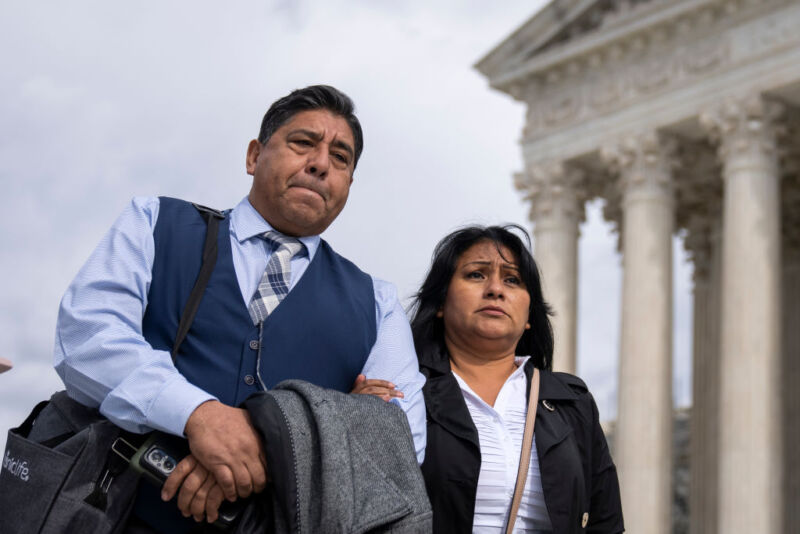
Today, the Supreme Court heard oral arguments to decide whether Section 230 immunity shields online platforms from liabilities when relying on algorithms to make targeted recommendations. Many Section 230 defenders feared that the court might be eager to chip away at the statute’s protections, terrified that in the worst-case scenario, the Supreme Court could doom the Internet as we know it. However, it became clear that justices had grown increasingly concerned about the potential large-scale economic impact of making any decision that could lead to a crash of the digital economy or an avalanche of lawsuits over targeted recommendations.
The case before the court, Gonzalez v. Google, asks specifically whether Google should be held liable for allegedly violating federal law that prohibits aiding and abetting a terrorist organization by making targeted recommendations that promoted ISIS videos to YouTube users. If the court decides that Section 230 immunity does not apply, that single decision could impact how all online platforms recommend and organize content, Google and many others have argued.
“Congress was clear that Section 230 protects the ability of online services to organize content,” Halimah DeLaine Prado, Google’s general counsel, told Ars in a statement. “Eroding these protections would fundamentally change how the Internet works, making it less open, less safe, and less helpful.”
Legal experts attending the proceedings said they felt much more optimistic that won’t happen, though, mostly because the Supreme Court’s questions almost exclusively focused on what the statute currently says and not on other legal questions like how Section 230 guards online speech. Santa Clara University School of Law professor Eric Goldman—who filed one of the dozens of briefs in support of Google in this case—told a panel audience today that because justices seemed to understand the full scope of what’s at stake in the case, “there’s some reason to be optimistic that Google will likely prevail.”
However, it’s all still up in the air. Tomorrow the Supreme Court hears oral arguments in a related case, Taamneh v. Twitter, which Goldman warned could impact the court’s decision on Gonzalez v. Google in ways that experts still cannot predict. It’s possible that a decision in Taamneh v. Twitter could lead Google to file a motion to dismiss the Gonzalez case and an opportunity for the Gonzalez family to further appeal. It’s likely that both cases won’t be resolved until June, CNN reported.
SCOTUS appears both cautious and confused
Oral arguments dragged on for two and a half hours while the Supreme Court considered the pros and cons of weakening Section 230. Lawyer Eric Schnapper argued on behalf of the family of Nohemi Gonzalez, a 23-year-old student killed in a 2015 Paris terrorist attack. His arguments seemed to stray sometimes from the logic used in the Gonzalez family’s complaint, and that frequently confused some justices who admittedly lacked expertise. At one point, Supreme Court Justice Elena Kagan pointed out that the question before the court today could be better suited to Congress since the justices are not “the nine greatest experts on the Internet.” Remaining cautious about disrupting the Internet, Kagan and others contended that Schnapper’s argument could create a future where a line is drawn and Section 230 protections end up applying to nothing.
“The line-drawing problems are real,” Schnapper told the court. “No one minimizes that.”
After Schnapper opened the proceeding, US Deputy Solicitor General Malcolm Stewart argued on behalf of the Justice Department, which partially supports the plaintiffs in this case. Stewart told the court that online platforms should be liable for design decisions they make that violate laws. Extreme hypotheticals were considered during oral arguments, such as a platform intentionally designing an algorithm to promote terrorist content. Google’s lawyer, Lisa Blatt, got some pushback when she argued that Section 230 immunity would apply in that extreme hypothetical.
When Justice Brett Kavanagh suggested this could lead to many more lawsuits, Stewart disagreed that tech companies would be buried by complaints. Stewart said that he “wouldn’t necessarily agree that there would be lots of lawsuits” because most negligence suits would likely be easily dismissed at the liability stage—before Section 230 questions come into play.
Blatt defended Section 230 as providing critical protections for online platforms, saying that weakening it to uphold this standard would cause “death by 1,000 cuts” if global tech companies and smaller platforms had to suddenly make business decisions based on 50 different states’ negligence laws.
https://arstechnica.com/?p=1919265

